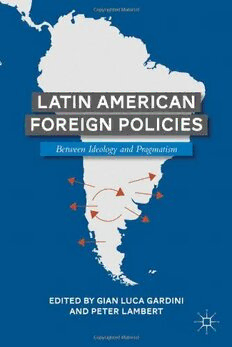
Latin American Foreign Policies: Between Ideology and Pragmatism PDF
285 Pages·2011·2.293 MB·English
Most books are stored in the elastic cloud where traffic is expensive. For this reason, we have a limit on daily download.
Preview Latin American Foreign Policies: Between Ideology and Pragmatism
Description:
In recent years several Latin American countries have adopted a more assertive and autonomous stance in their foreign policy. The growing rejection of neo-liberalism as an ideological dogma seems to have given space to more pragmatic stances in favour of national interests. Whilst ideological discourse continues to be directed towards both domestic and international audiences with varying intensities and tones, it appears to be combined with clearly pragmatic policies and aims. This book reviews the foreign policy of eleven Latin American countries and argues that a combination of pragmatism and ideology characterises contemporary Latin American approaches to international relations. It analyses whether this is a permanent or contingent feature, what factors affect the mix of pragmatism and ideology, and whether this is an identifiable new pattern of foreign policy in Latin America
See more
The list of books you might like
Most books are stored in the elastic cloud where traffic is expensive. For this reason, we have a limit on daily download.
